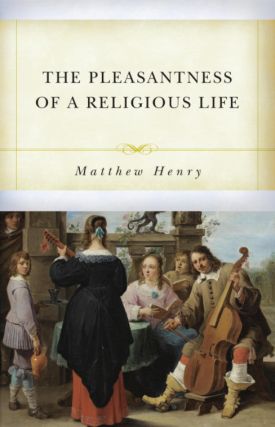save
$2.25The Pleasantness of a Religious Life (Matthew Henry)
$13.75$16.00
True piety has true pleasure in it.
In six chapters on Proverbs 3:17, Matthew Henry proves and illustrates the doctrine of religious pleasantness, saying the religious life is the only life worth living. “What was the fall and apostasy of man, and what is still his sin and misery, but the soul’s revolt from the divine life, and giving up itself wholly to the animal life?”
Henry’s work is a treasure, helping to demolish Satan’s insinuation that true religion is boring and burdensome. Read Henry’s Pleasantness of a Religious Life and see why Christians really are the happiest creatures on earth.
In stock
The Pleasantness of a Religious Life
True piety has true pleasure in it.
In six chapters on Proverbs 3:17, Matthew Henry proves and illustrates the doctrine of religious pleasantness, saying the religious life is the only life worth living. “What was the fall and apostasy of man, and what is still his sin and misery, but the soul’s revolt from the divine life, and giving up itself wholly to the animal life?”
Henry’s work is a treasure, helping to demolish Satan’s insinuation that true religion is boring and burdensome. Read Henry’s Pleasantness of a Religious Life and see why Christians really are the happiest creatures on earth.
Table of Contents:
- Explication of the Doctrine
- Proved from the Nature of True Religion
- Proved from the Comfort and Privileges
- Proven by Experience
- Illustrated as a Pleasant Journey
- Vindicated from Enemies of Religion
- Application of the Doctrine
About the Author
Matthew Henry (1662–1714) was son of the Puritan minister Philip Henry and student of minister Thomas Doolittle. He pastored churches in Chester and Hackney, England. Matthew Henry is known best for his complete commentary on the Old and New Testaments.
Endorsement
“Isaac Watts taught us to sing that ‘religion never was designed to make our pleasures less.’ Matthew Henry describes and demonstrates the truth of that assertion, outlining the comforts and privileges of true religion taught in Scripture and known by experience. It is a sweet corrective to any who suspect or indulge the idea that there is an inherent sourness in real Christianity. If we grasp what Matthew Henry writes, then we will also sing with John Newton that these truly are the ‘solid joys and lasting treasures’ that are found only in the pleasant paths of heavenly peace.” — Jeremy Walker, pastor, Maidenbower Baptist Church, Crawley, UK. Author of Anchored in Grace: Fixed Points for Humble Faith, and The Brokenhearted Evangelist
| Weight | 0.55 lbs |
|---|








